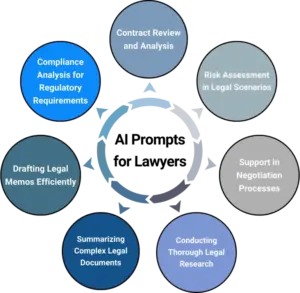Within the financial industry, efficient contract management is paramount for ensuring compliance and optimizing operations. Incorporating CLM software revolutionizes the way financial institutions handle contracts, streamlining processes and enhancing visibility.
This blog explores how Contract Lifecycle Management (CLM) software helps finance teams by centralizing contract storage and renewal processes. It discusses why CLM is crucial for the financial industry, highlighting its benefits, challenges, and advancements. Embracing CLM technology can greatly improve profitability and operational efficiency in managing finance contracts.
Understanding Contract Management in Finance

Contract management in the financial sector involves overseeing all contract-related processes within financial institutions. This includes creating, executing, and renewing contracts. Key tasks involve managing different financial agreements and ensuring they follow regulatory standards.
Having a central place to store contracts makes operations smoother. Effective contract management helps financial institutions operate more efficiently and reduces risks. This is crucial for maintaining financial stability and complying with regulations.
Proper contract management ensures compliance, reduces risks and boosts efficiency. It prevents legal disputes and financial losses, streamlines processes manages payment terms, and tracks contract renewals accurately. Central digital repositories provide easy access to contract information, improving transparency and decision-making. In financial institutions, contract management is essential for regulatory adherence and successful financial transactions.
Related Article: Elevate Technology Industry With Contract Management Software
Key Components of Financial Contracts

Parties Involved
This section identifies all the entities or individuals entering the contract. It’s crucial because it specifies who is responsible for fulfilling the obligations outlined in the contract. Identifying the parties helps prevent confusion or disputes about who is accountable for each agreement aspect.
Payment Terms
This component details the financial aspects of the contract. It includes the amount to be paid, the schedule for payments, the method of payment, and any penalties for late payments. Clear payment terms ensure that both parties understand their financial obligations, reducing the risk of misunderstandings or disputes over money.
Duration and Termination
This section specifies how long the contract will last and the conditions under which it can be renewed or terminated. It outlines the start and end dates and explains what happens if one party wants to end the contract early. Having clear terms for duration and termination helps both parties plan and manage their obligations effectively.
Compliance with Laws and Regulations
This part ensures that all activities under the contract comply with relevant legal and regulatory requirements. It is essential because financial contracts often involve complex legal and regulatory frameworks. Ensuring compliance helps prevent legal issues and ensures that the contract’s execution adheres to the required standards and laws.
Related Article: Contract Management Software (CLM) For Transportation Industry
Types of Contracts Used in the Financial Industry

Investment Contracts
These agreements outline the terms of investment services provided by a financial institution. Investment contracts explain the types of investments, management fees, risk factors, and the responsibilities of both the investor and the institution. They are essential for defining the terms of investment services and ensuring compliance with regulatory standards.
Loan agreements, on the other hand, specify the terms of a loan, including the amount borrowed, interest rates, repayment schedule, and the obligations of both the borrower and the lender.
These contracts outline the terms under which a financial institution lends money to a borrower. They include details about the loan amount, interest rate, repayment schedule, and any collateral required. Loan agreements ensure both parties are clear about their obligations and the conditions of the loan.
Credit Agreements
Similar to loan agreements, these contracts specify the terms under which a financial institution extends credit to a borrower. They detail the credit limit, interest rates, repayment terms, and penalties for default. Credit agreements are crucial for managing the terms and conditions of credit facilities provided to customers.
Deposit Agreements
These contracts govern the terms under which a customer deposits money with a financial institution. They include details about the interest rate, withdrawal terms, and any penalties for early withdrawal. Deposit agreements help protect the interests of both the depositor and the institution.
Branch Lease Agreements
These contracts outline the terms under which a financial institution leases property for its branch locations. They include details about the lease duration, rental payments, maintenance responsibilities, and conditions for renewal or termination. Branch lease agreements help the institution secure suitable locations for its operations. They clearly define the rights and responsibilities of both the landlord and the tenant.
Related Article: How Can Pharmaceutical Industry Benefit From CLM Software
Challenges Faced by the Finance Sector

Data Security: Safeguarding sensitive financial data against cyber threats like phishing and hacking remains paramount. Continuous updates to security protocols are necessary to mitigate evolving risks and protect customer information.
Data Management: Efficiently managing vast amounts of data is crucial for informed decision-making. Effective data governance and analytics frameworks are essential to ensure accuracy, reliability, and compliance with regulatory requirements.
Digital Transformation: Despite efforts to digitize processes, financial institutions still grapple with transitioning from paper-based workflows to fully digital operations. Overcoming legacy systems and optimizing digital document management is pivotal for efficiency gains.
Risk in Partnerships: Collaborating with external partners introduces risks such as conflicting goals, cybersecurity vulnerabilities, and regulatory compliance discrepancies. Robust risk assessment frameworks are necessary to mitigate these risks effectively.
Technology Integration: Integrating new technologies with existing systems is complex and challenging. Financial institutions often face compatibility issues and data migration difficulties, making seamless integration a critical but demanding task. try to make this similar to your intelligence.
Related Article: 7 Key Contract Clauses Found In Business Contracts
CLM Software for the Finance Industry

The financial sector is seeing big changes in how contracts are managed, thanks to new technology. One major trend is using artificial intelligence (AI) in contract management software. AI can automate tasks like creating, reviewing, and analyzing contracts, which saves time and makes everything more accurate. It also helps analyze a lot of data to give insights that help organizations make smart decisions and improve how contracts work.
Another trend is using analytics in contract management. These tools give organizations useful information about contract data, like how long things take, the risks involved, and if they follow rules. This helps organizations find ways to do better and make decisions based on data to manage contracts better.
Overall, these trends in contract management technology, like AI and analytics, have the potential to change how contracts are handled in finance. They make things more efficient and help organizations work better with contracts.
CLM Features that Benefit the Financial Sector
- Analytics Capabilities: CLM software offers analytics to provide insights into contract performance, cycle times, savings, risks, and compliance. This helps financial institutions make informed decisions and optimize contract management.
- Comprehensive Dashboard: Stakeholders can access contract-related information, key metrics, and upcoming milestones in one centralized and user-friendly dashboard.
- Proactive Alerts and Notifications: CLM software sends alerts to ensure important contract events like expiry or renewal deadlines are not overlooked.
- Workflow Automation: Automation in CLM solutions streamlines contract processes, ensuring compliance and reducing manual errors.
- Enhanced Efficiency and Accuracy: These features collectively enhance efficiency, accuracy, and compliance in managing contracts, allowing organizations to maximize their contract assets.
Related Article: How Much Are You Losing Without A CLM Platform?
Why Choose Volody’s CLM Software?

Volody’s AI contract management software for finance helps streamline your contract operations. It gives you full control over contracts and lets you track cash flow accurately across your organization. Unlock the data present in your agreements & minimize risk by improving visibility to quickly identify breaches, non-compliance, cost overruns, and risks.
Manage all your contracts efficiently and uncover financial insights within them. Ensure compliance and reduce financial risks with Volody’s AI CLM software to improve financial visibility.
Reduce Spend Leakage
Maintain complete control over the contracting process, preventing any costly oversight or errors. Track performance against vendor deliverables & make sure your company meets all benchmarks. Improve your spend visibility & analyze risk to avoid revenue leakage. Integrate with your ERP or PO systems to trigger payment alerts to all team members.
Accurate Forecasting
View all your financial contract insights on one single platform. Effectively monitor expenses and project forecast spending with precise expenditure tracking. Use advanced filters to generate robust MIS reports from Volody’s AI CLM software. Make informed business decisions with Volody AI CLM software’s smart data-driven insights.
Identify & Minimize Risk
Quickly identify contractual risk, non-compliance, and cost overruns. Standardize your contracts, reducing the risk of penalties, fines, and other consequences. Identify best practices & mistakes to avoid, with deep analytics into previously executed contracts. Negotiate better prices, discounts, and perks from vendors, ensuring long-term cost savings.
Related Article: AI And Law: Comprehensive Guide To Stay Up To Date
Features of Volody’s AI CLM Software

Central Contract Repository
Keep all your contracts in one safe place for easy access. This feature of Contract management software is very useful for finance because it keeps all financial agreements and contracts in one place for easy access when needed. It helps financial institutions handle their contracts well, follow rules correctly, and lower the risk of losing documents or letting unauthorized people see them.
Reduce Revenue Leakage
CLM software helps the finance sector by improving visibility and control over spending during contract processes. This prevents mistakes and oversights in financial transactions and agreements. It ensures that revenue isn’t lost due to missed opportunities or errors in contract terms, making financial operations more efficient and accurate.
Custom Integrations
Our AI CLM software seamlessly connects with your internal systems such as ERP, SSO, HRMS, CRMs, and others. This feature is very useful for the finance sector because it allows contract management to work well with other important business systems.
It makes sure that financial data and contract information match up across different platforms. This improves how efficiently financial operations run, cuts down on mistakes made by hand, and boosts productivity for the whole organization. Integrating these systems also enables better decision-making and streamlined workflows within financial departments.
Configurable Dashboard & Reporting
CLM software offers a dashboard and reporting feature that’s customizable for finance sectors. It helps to remove obstacles in contracts and find important information to increase how much work gets done. This feature lets financial experts create dashboards that show important contract details like deadlines and how well things are going.
It makes it easier to keep an eye on contract statuses, find problems early, and get useful information to make contracts work better. This helps finance teams decide things based on facts, do work better, and make sure they follow contract rules, which makes the whole organization work better.
Approval Workflows
Set up approval workflows with a simple drag-and-drop interface and automate email reminders to all stakeholders. This feature from CLM software helps the finance sector by making the approval process for financial agreements and contracts more efficient.
It lets finance teams set approval steps, assign tasks to the right people, and see progress right away. Automated reminders ensure everyone stays informed about what’s going on and meets deadlines, making financial operations smoother with fewer delays. This feature helps ensure compliance with internal policies and regulatory requirements, enhancing overall contract management effectiveness in financial institutions.
Related Article: What Are Risks Of Not Having A CLM Software?
Frequently Asked Questions
What is the biggest benefit of using CLM in the financial sector?
The main advantage of using contract lifecycle management (CLM) in finance is that it makes things more efficient and compliant. CLM software makes contract management easier by automating processes and cutting down on manual work. It also lets you see all your contracts easily, so you can make sure you’re following the law. With a central digital place for contracts, organizations can find and handle contracts easily, which improves how they handle risks and how well they work overall.
How do I choose the right CLM software for my organization?
Choosing the right contract management software means understanding what your organization needs for contracts. Consider things like how complicated your processes are, who’s involved, what features you need, how trusted the provider is, and how much they know about your industry.
What steps should be taken to ensure successful CLM implementation?
To successfully implement CLM, financial institutions should follow these steps: Start with clear project management to set goals, and timelines, and allocate resources. Engage key stakeholders to get their support and ensure smooth adoption.
Use standardized contract templates to simplify creating contracts. Automate workflows to work faster and make fewer mistakes. Continuously check and improve the CLM system to keep it working well.
Conclusion
In conclusion, effective contract management is paramount for financial institutions to navigate regulatory hurdles and manage intricate agreements. Embracing contract lifecycle management (CLM) technology offers transformative benefits by streamlining processes and enhancing compliance.
By adopting CLM solutions, financial sectors can optimize performance and stay ahead in the ever-evolving landscape of finance. Ensuring ongoing excellence through training, user adoption strategies, and monitoring is crucial for sustained success. As CLM technology keeps advancing, staying updated on new trends and getting ready for regulatory changes will be crucial for making sure contract management stays effective in the financial sector.





